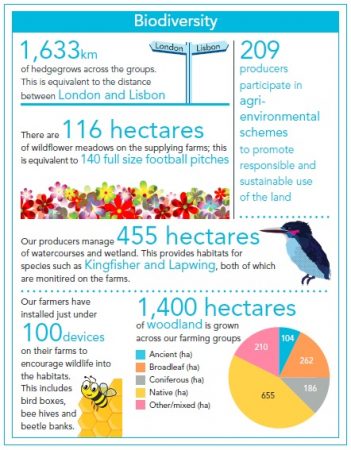Co-op Group farmers have planted a network of ‘bee’ roads throughout the UK to support pollinators and improve biodiversity.
In 2016 the Co-op Group launched Enviro-Map, a three-year scheme aimed at monitoring and managing the environmental impact of its farming groups. As part of this programme, Co-op Group farmers have planted 1,000 miles (1,633 km) of hedgerows that are managed across the farming groups – enough to stretch from London to Lisbon.

The retailer’s environment-impact measurement tool shows that farmers have also planted 1,400 hectares of woodland, including native, coniferous and broadleaf areas, and 455 hectares of watercourses and wetlands, which provide habitats for species such as kingfisher and lapwing. Co-op farmers also developed 116 hectares of wildflower meadows and host 100 devices on farms to encourage wildlife into natural habitats including bird boxes, bee hives and beetle banks.
Caroline Morris of Manor Farm, which is part of the Group’s Beef Farming Group, has planted wildflower margins around the field boundaries on her Buckinghamshire farm.
She said: “The wildflowers look fantastic in the summer and they’ve certainly increased the number of butterflies on the farm. Our neighbour, who produces honey, has found an increase in production since our wildflowers have been in place so there has clearly been an increase in the number of bees in the area.”
The scheme also looks at the focus placed on renewable energy. According to the Enviro-Map, the 400 farmers taking part in the self-assessment programme produced over 20m kWh of energy every year – enough to power 5,000 homes. Nearly 80% of farms export the equivalent of the electricity they consume with over two-thirds (65%) favouring solar panels and a further 16% opting for wind turbines.
Matt Hood, the Group’s trading director, added: “The need to create a more sustainable approach to farming and food production is just as important as producing high-quality, fairly-priced food and we can only achieve this with regular and reliable measurement of our producers. We are delighted to see that in year one alone, they are already offsetting their farming practises by contributing heavily to improved biodiversity levels which are so utterly critical to the air we breathe and the water we drink.”
The Enviro-Map scheme is accredited by the Carbon Trust and was pioneered in collaboration with environment specialists Alltech E-CO2.

